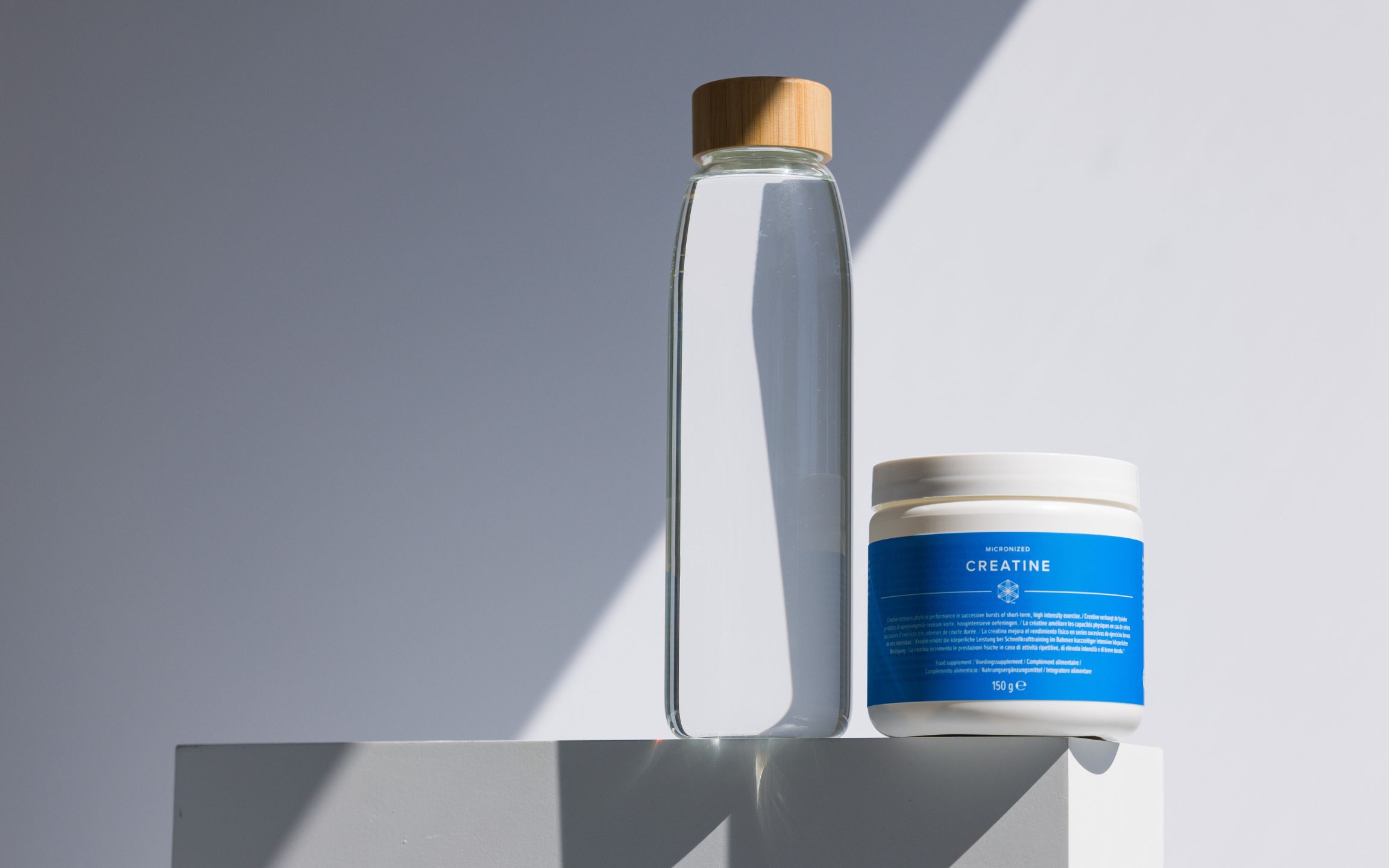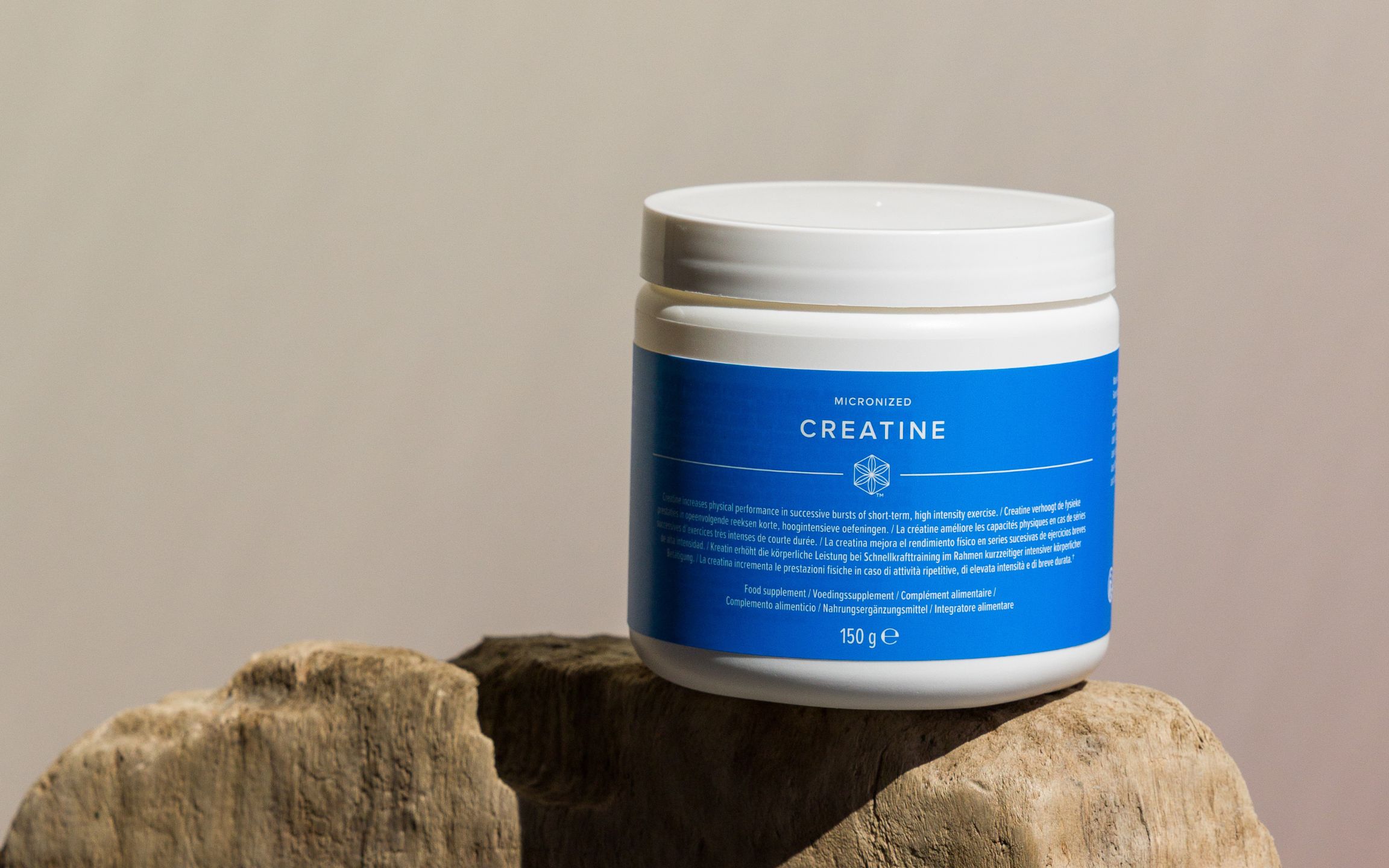Break Through Performance Plateaus With Creatine
November 13, 2025,
Ashleigh Turnbull

Break Through Performance Plateaus With Creatine
Similar to plateaus that happen with weight loss, athletes also see them with sport, particularly in resistance training.
The reality is that the more experience a person has with exercising, the more difficult it is to make progress (1, 2). For this reason, many studies that investigate sports supplements do so in untrained individuals, yet the results from these products may not be applicable to more seasoned athletes.
Creatine might be the exception to the rule. According to a newly published research report, the supplement taken daily demonstrated that it could lead to increases in muscle mass even in experienced resistance trained men (3).
Creatine for 12 Weeks in Experienced Weight Lifters
Sport scientists randomised 45 men who were experienced with resistance training into two groups: one that received slightly above 2 grams of creatine and one that received a placebo. They carried out the study over 12 weeks with pre- and post-testing that consisted of anthropometric and body composition measurements.
With guidance from a dietitian, the subjects maintained their usual dietary intake throughout the intervention period. They also participated in a resistance training program. Results? The subjects who supplemented with creatine saw significantly increased muscle mass over the placebo group with the greatest effects seen in the upper limbs. The authors speculated that the difference in muscle mass response in the upper versus the lower limbs may be due to the muscle fibre composition. For example, there’s generally a higher percentage of fast-twitch fibres in the upper compared to lower-body muscles (4).
Takeaway: Creatine Works Even for Seasoned Athletes
Creatine may offer a way to increase performance in those more experienced athletes. The reason is that it accelerates the rate of restoring cellular energy during and after exercise (5-7). What this means for the athlete is greater strength, less fatigue, and a shorter recovery period (5-7).
Another way that creatine might work is by leading to an increase in intracellular water (8). That increased cellular hydration may contribute to greater muscle building by stimulating pathways that increase protein synthesis and suppressing those involved in protein degradation (9).
References
- Ahtiainen JP, Pakarinen A, Alen M et al. Muscle hypertrophy, hormonal adaptations and strength development during strength training in strength-trained and untrained men. Eur J Appl Physiol. 2003 Aug;89(6):555-63.
- Deschenes MR, Kraemer WJ. Performance and physiologic adaptations to resistance training. Am J Phys Med Rehabil. 2002 Nov;81(11 Suppl): S3-16.
- Nunes JP, Ribeiro AS, Schoenfeld BJ et al. Creatine supplementation elicits greater muscle hypertrophy in upper than lower limbs and trunk in resistance-trained men. Nutr Health. 2017 Dec;23(4):223-229.
- Sjøgaard G. Capillary supply and cross-sectional area of slow and fast twitch muscle fibres in man. Histochemistry. 1982;76(4):547-55.
- Bemben MG, Lamont HS. Creatine supplementation and exercise performance: recent findings. Sports Med. 2005;35(2):107-25.
- Branch JD. Effect of creatine supplementation on body composition and performance: a meta-analysis. Int J Sport Nutr Exerc Metab. 2003 Jun;13(2):198-226.
- Lanhers C, Pereira B, Naughton G et al. Creatine Supplementation and Upper Limb Strength Performance: A Systematic Review and Meta-Analysis. Sports Med. 2017 Jan;47(1):163-173.
- Powers ME, Arnold BL, Weltman AL et al. Creatine Supplementation Increases Total Body Water Without Altering Fluid Distribution. J Athl Train. 2003 Mar;38(1):44-50.
- Schoenfeld BJ. Potential mechanisms for a role of metabolic stress in hypertrophic adaptations to resistance training. Sports Med. 2013 Mar;43(3):179-94.
Durchbreche Leistungsplateaus mit Kreatin
Ähnlich wie bei Gewichtsverlust-Plateaus erleben auch Sportler Phasen, in denen ihre Leistungsentwicklung stagniert – insbesondere im Krafttraining.
Tatsächlich gilt: Je mehr Trainingserfahrung jemand hat, desto schwieriger wird es, weitere Fortschritte zu erzielen (1, 2). Daher werden viele Studien zu Nahrungsergänzungsmitteln an untrainierten Personen durchgeführt – deren Ergebnisse lassen sich allerdings nicht immer auf erfahrene Athleten übertragen.
Kreatin könnte hier jedoch eine Ausnahme darstellen. Ein kürzlich veröffentlichter Forschungsbericht zeigt, dass eine tägliche Einnahme von Kreatin selbst bei erfahrenen Kraftsportlern zu einer Zunahme der Muskelmasse führen kann (3).
12-wöchige Kreatin-Supplementierung bei erfahrenen Gewichthebern
Sportwissenschaftler randomisierten 45 Männer mit langjähriger Krafttrainingserfahrung in zwei Gruppen:
Eine Gruppe erhielt täglich etwas mehr als 2 Gramm Kreatin, die andere ein Placebo. Die Studie erstreckte sich über 12 Wochen und umfasste prä- und postinterventionelle Messungen der Anthropometrie und Körperzusammensetzung.
Unter Anleitung eines Ernährungsberaters hielten die Teilnehmer ihre gewohnte Ernährung bei und absolvierten zudem ein strukturiertes Widerstandstraining.
Das Ergebnis: Die Kreatin-Gruppe zeigte im Vergleich zur Placebo-Gruppe eine signifikante Zunahme der Muskelmasse – mit den größten Effekten im Bereich der oberen Extremitäten. Die Autoren spekulierten, dass dieser Unterschied auf die unterschiedliche Muskelfaserzusammensetzung zurückzuführen sein könnte, da im Oberkörper tendenziell ein höherer Anteil an schnellzuckenden Muskelfasern vorliegt (4).
Fazit: Kreatin wirkt auch bei erfahrenen Athleten
Kreatin kann selbst erfahrenen Athleten dabei helfen, ihre Leistung weiter zu verbessern. Dies liegt unter anderem daran, dass die Supplementierung die Wiederherstellung der zellulären Energie während und nach dem Training beschleunigt (5–7).
Für Athleten bedeutet das: mehr Kraft, geringere Ermüdung und kürzere Erholungszeiten (5–7).
Ein weiterer möglicher Wirkmechanismus ist der Anstieg des intrazellulären Wassers (8). Diese zusätzliche Zellhydratation kann das Muskelwachstum fördern, indem sie Signalwege aktiviert, die die Proteinsynthese steigern und solche hemmt, die den Proteinabbau begünstigen (9).
Referenzen
- Ahtiainen JP, Pakarinen A, Alen M et al. Muscle hypertrophy, hormonal adaptations and strength development during strength training in strength-trained and untrained men. Eur J Appl Physiol. 2003 Aug;89(6):555-63.
- Deschenes MR, Kraemer WJ. Performance and physiologic adaptations to resistance training. Am J Phys Med Rehabil. 2002 Nov;81(11 Suppl): S3-16.
- Nunes JP, Ribeiro AS, Schoenfeld BJ et al. Creatine supplementation elicits greater muscle hypertrophy in upper than lower limbs and trunk in resistance-trained men. Nutr Health. 2017 Dec;23(4):223-229.
- Sjøgaard G. Capillary supply and cross-sectional area of slow and fast twitch muscle fibres in man. Histochemistry. 1982;76(4):547-55.
- Bemben MG, Lamont HS. Creatine supplementation and exercise performance: recent findings. Sports Med. 2005;35(2):107-25.
- Branch JD. Effect of creatine supplementation on body composition and performance: a meta-analysis. Int J Sport Nutr Exerc Metab. 2003 Jun;13(2):198-226.
- Lanhers C, Pereira B, Naughton G et al. Creatine Supplementation and Upper Limb Strength Performance: A Systematic Review and Meta-Analysis. Sports Med. 2017 Jan;47(1):163-173.
- Powers ME, Arnold BL, Weltman AL et al. Creatine Supplementation Increases Total Body Water Without Altering Fluid Distribution. J Athl Train. 2003 Mar;38(1):44-50.
- Schoenfeld BJ. Potential mechanisms for a role of metabolic stress in hypertrophic adaptations to resistance training. Sports Med. 2013 Mar;43(3):179-94.
Doorbreek prestatieplateaus met creatine
Net zoals er plateaus kunnen optreden bij gewichtsverlies, ervaren atleten deze ook in hun sport, vooral bij krachttraining.
De realiteit is dat hoe meer ervaring iemand heeft met trainen, hoe moeilijker het wordt om vooruitgang te boeken (1, 2). Daarom worden veel studies naar sport-supplementen uitgevoerd bij ongetrainde personen, terwijl de resultaten niet altijd toepasbaar zijn op meer ervaren atleten.
Creatine lijkt echter een uitzondering op die regel te zijn. Volgens een recent gepubliceerd onderzoeksrapport kan dagelijks gebruik van het supplement leiden tot een toename van de spiermassa, zelfs bij ervaren krachttrainers (3).
Creatine gedurende 12 weken bij ervaren gewichtheffers
Sportwetenschappers verdeelden 45 mannen met ervaring in krachttraining in twee groepen: één groep kreeg iets meer dan 2 gram creatine per dag en de andere een placebo. De studie duurde 12 weken en omvatte metingen van lichaamsbouw en lichaamssamenstelling voor en na de interventie.
Onder begeleiding van een diëtist behielden de deelnemers hun gebruikelijke eetpatroon gedurende de studieperiode. Ze namen ook deel aan een krachttrainingsprogramma.
De resultaten? De mannen die creatine namen, zagen een significante toename in spiermassa vergeleken met de placebogroep, met de grootste effecten in de bovenste ledematen. De onderzoekers vermoedden dat dit verschil te maken kan hebben met de spiervezelverdeling: in de bovenlichaamspieren komen doorgaans meer snelle (fast-twitch) spiervezels voor dan in de beenspieren (4).
Conclusie: Creatine werkt zelfs voor ervaren atleten
Creatine kan helpen om prestaties te verbeteren, zelfs bij ervaren sporters. Het werkt doordat het de snelheid verhoogt waarmee cellulaire energie tijdens en na inspanning wordt hersteld (5-7).
Voor de atleet betekent dit meer kracht, minder vermoeidheid en een kortere hersteltijd (5-7).
Daarnaast kan creatine zorgen voor een toename van het intracellulaire water (8). Die extra celhydratatie kan bijdragen aan meer spiergroei door processen te stimuleren die eiwitsynthese bevorderen en die de eiwitafbraak remmen (9).
Referenties
- Ahtiainen JP, Pakarinen A, Alen M et al. Muscle hypertrophy, hormonal adaptations and strength development during strength training in strength-trained and untrained men. Eur J Appl Physiol. 2003 Aug;89(6):555-63.
- Deschenes MR, Kraemer WJ. Performance and physiologic adaptations to resistance training. Am J Phys Med Rehabil. 2002 Nov;81(11 Suppl): S3-16.
- Nunes JP, Ribeiro AS, Schoenfeld BJ et al. Creatine supplementation elicits greater muscle hypertrophy in upper than lower limbs and trunk in resistance-trained men. Nutr Health. 2017 Dec;23(4):223-229.
- Sjøgaard G. Capillary supply and cross-sectional area of slow and fast twitch muscle fibres in man. Histochemistry. 1982;76(4):547-55.
- Bemben MG, Lamont HS. Creatine supplementation and exercise performance: recent findings. Sports Med. 2005;35(2):107-25.
- Branch JD. Effect of creatine supplementation on body composition and performance: a meta-analysis. Int J Sport Nutr Exerc Metab. 2003 Jun;13(2):198-226.
- Lanhers C, Pereira B, Naughton G et al. Creatine Supplementation and Upper Limb Strength Performance: A Systematic Review and Meta-Analysis. Sports Med. 2017 Jan;47(1):163-173.
- Powers ME, Arnold BL, Weltman AL et al. Creatine Supplementation Increases Total Body Water Without Altering Fluid Distribution. J Athl Train. 2003 Mar;38(1):44-50.
- Schoenfeld BJ. Potential mechanisms for a role of metabolic stress in hypertrophic adaptations to resistance training. Sports Med. 2013 Mar;43(3):179-94.
Briser les plateaux de performance grâce à la créatine
Tout comme les plateaux observés lors de la perte de poids, les athlètes connaissent également des stagnations dans leur progression, en particulier dans l’entraînement en résistance.
En réalité, plus une personne est expérimentée en entraînement, plus il devient difficile de progresser (1, 2). C’est pourquoi de nombreuses études sur les suppléments sportifs se concentrent sur des individus non entraînés — des résultats qui ne sont pas toujours applicables aux athlètes chevronnés.
La créatine semble toutefois faire exception à cette règle. D’après une étude récemment publiée, une supplémentation quotidienne en créatine pourrait augmenter la masse musculaire, même chez des hommes expérimentés en musculation (3).
Créatine pendant 12 semaines chez des haltérophiles expérimentés
Les scientifiques du sport ont réparti 45 hommes expérimentés en musculation en deux groupes : l’un recevant un peu plus de 2 grammes de créatine par jour et l’autre un placebo.
L’étude a duré 12 semaines et comprenait des mesures anthropométriques et de composition corporelle avant et après l’intervention.
Sous la supervision d’un diététicien, les participants ont maintenu leur régime alimentaire habituel et suivi un programme d’entraînement en résistance.
Résultats : les participants ayant pris de la créatine ont présenté une augmentation significative de la masse musculaire par rapport au groupe placebo, avec des effets particulièrement marqués au niveau des membres supérieurs. Les auteurs ont suggéré que cette différence pouvait être liée à la composition en fibres musculaires — les muscles du haut du corps comportant généralement une plus grande proportion de fibres à contraction rapide (4).
Conclusion : La créatine fonctionne même chez les athlètes confirmés
La créatine peut améliorer la performance même chez les athlètes expérimentés. Elle agit en accélérant la restauration de l’énergie cellulaire pendant et après l’effort (5-7).Pour l’athlète, cela se traduit par une plus grande force, une fatigue réduite et une récupération plus rapide (5-7).
Un autre mécanisme possible est l’augmentation de l’eau intracellulaire (8), ce qui peut favoriser la croissance musculaire en stimulant la synthèse des protéines et en réduisant leur dégradation (9).
Références
- Ahtiainen JP, Pakarinen A, Alen M et al. Muscle hypertrophy, hormonal adaptations and strength development during strength training in strength-trained and untrained men. Eur J Appl Physiol. 2003 Aug;89(6):555-63.
- Deschenes MR, Kraemer WJ. Performance and physiologic adaptations to resistance training. Am J Phys Med Rehabil. 2002 Nov;81(11 Suppl): S3-16.
- Nunes JP, Ribeiro AS, Schoenfeld BJ et al. Creatine supplementation elicits greater muscle hypertrophy in upper than lower limbs and trunk in resistance-trained men. Nutr Health. 2017 Dec;23(4):223-229.
- Sjøgaard G. Capillary supply and cross-sectional area of slow and fast twitch muscle fibres in man. Histochemistry. 1982;76(4):547-55.
- Bemben MG, Lamont HS. Creatine supplementation and exercise performance: recent findings. Sports Med. 2005;35(2):107-25.
- Branch JD. Effect of creatine supplementation on body composition and performance: a meta-analysis. Int J Sport Nutr Exerc Metab. 2003 Jun;13(2):198-226.
- Lanhers C, Pereira B, Naughton G et al. Creatine Supplementation and Upper Limb Strength Performance: A Systematic Review and Meta-Analysis. Sports Med. 2017 Jan;47(1):163-173.
- Powers ME, Arnold BL, Weltman AL et al. Creatine Supplementation Increases Total Body Water Without Altering Fluid Distribution. J Athl Train. 2003 Mar;38(1):44-50.
- Schoenfeld BJ. Potential mechanisms for a role of metabolic stress in hypertrophic adaptations to resistance training. Sports Med. 2013 Mar;43(3):179-94.




